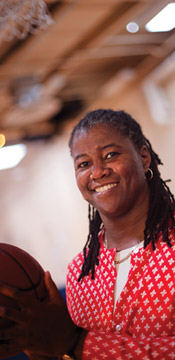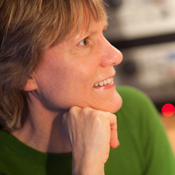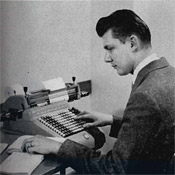Meet a Faculty Member: Myra Waters
Category: WebExtras

Myra Waters, adjunct faculty member and director of UB’s Counseling Center, has been named to the ACC Women’s Basketball Legends for her time as a Terp; she still holds some University of Maryland, College Park records. photography: Chris Hartlove
A 2012 ACC Women’s Basketball Legend, an ACC champion, an NCAA Final Four competitor, an all-time top-10 Terp even three decades out, Myra Waters has made her mark on the court. Off of it, the director of UB’s Counseling Center and an adjunct faculty member supports students when they need it most. Here, she rebounds with additional insight into her athletic career.
Q: When did you first start playing basketball and did you ever have a sense that it would lead you to where you are today?
A: Actually, my first sport was track and field, mostly because of my older sister Corine Allen. In 1970, she earned a scholarship to run track at Kalispell Community College in Montana. At that time, track and softball seemed to be the most popular sports for girls. I did not see women playing organized basketball at the high school and college levels until I was 10 years old. Soon thereafter, one of my older brothers introduced me to my first game of pick-up basketball on a playground.
Title IX became law in 1972, a year before I decided I wanted to pursue a career as a psychologist. That is when I began to realize that I would need a scholarship of some kind to attend the college of my choice. I believe that God caused some unique circumstances to come together just in time for me and others like me to take advantage of this new era in education for women.
Q: What is the significance of your basketball scholarship to where you are today?

A: Although my parents would have made provisions for me to attend college in Ohio, as they did for my five siblings, there is no way I could have afforded the out-of-state tuition for the University of Maryland. So that scholarship to play basketball was pretty significant to me being where I am today.
Q: What do you consider the highlight of your time playing for the Terps?
A: I would have to say being a starter on a team that won three Atlantic Coast Conference Women’s Basketball tournaments in four years. Second to that would be earning a trip to the first-ever NCAA Women’s Basketball Final Four in 1982 in Norfolk, Va. In terms of individual performances, I scored 29 points at [a tournament at] Madison Square Garden in New York [City, in December 1979].
Q: Do you still play?
A: No way! That would result in my very stiff and painful demise. I am pleased to have shared my love of the game through coaching girls in the Amateur Athletic Union (Maryland Classics, 12 & Under National Championships at Disney World, first place, 2001) and I have also coached at the collegiate level (two years each at Georgetown University as assistant coach and at the University of Maryland, College Park as a graduate assistant coach).
Q: You’ve said that you donated your Terps uniform to the African American Legacy Project in your hometown of Toledo, Ohio. How did you become connected with that initiative? And is it the uniform that you took to the first-ever NCAA Women’s Final Four?

A: The primary function of the African American Legacy Project is to discover, document and preserve artifacts and historical information demonstrative, representative and reflective of life, lifestyles and culture of Toledo’s African-American community [per the organization’s mission statement]. The director of the organization contacted me several times, seeking to include some of my possessions along with those of other African Americans from Toledo who had impressive achievements in athletics. Recognizing that my sports memorabilia was only collecting dust at my parents’ home in Toledo, I donated the awards (trophies, certificates, plaques, her varsity M, etc.) to this important project last spring after the ACC Women’s Basketball Legends event. And my jersey from the first NCAA Women’s Basketball Final Four was part of the collection that I donated. The timing was perfect—just like a great bounce pass.
Q: What message would you relay to today’s young female athletes?
A: Playing collegiate sports can be fun, exciting and very rewarding on many levels. But it will challenge personal identity, values and character in ways that young people can hardly be expected to anticipate or manage without self-awareness and strong support. So approach your experience in collegiate sports with a balanced perspective, knowing you are there not only to receive training in athletics but, most importantly, to train your mind for success in life.





